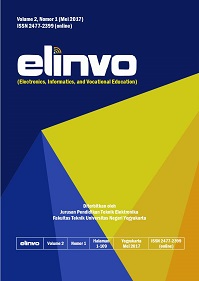A Bibliometric Analysis of Green Skills Research in Vocational Education: 2018-2022
DOI:
https://doi.org/10.21831/elinvo.v9i1.71890Keywords:
Bibliometric analysis, vocational education, sustainability skillsAbstract
Green skills (GSs) have become one of the important strategies for achieving sustainable development. It can make the environment effective for social and economic development. The aim of this research is to reveal data on the evolution and development of green skills and trends in the development of green jobs throughout the world. This research uses R Studio and Bibliometrix to analyze 198 papers related to green skills in green jobs published from 2018 to 2022 in the Scopus database using Bibliometrix and visualization mapping methods. The results show a substantial increase in the number of studies GSs in recent years, with the focus area in European and American countries leading this research. Aspects of Will, manufacturing and Energy, and Journals of Green Environmental Management are the first three journals cited in the study of GSs. Studying the cited literature together on environmentally friendly skills includes, among other things, the relationship between other skills and ecosystems with human good health, green construction, evaluation and green management of environmentally friendly competencies, and analysis of specific aspects of environmentally friendly skills. The results of the analysis of green skills grouping keywords show that there is research that concentrates on green skills in the fields of education, ecosystem services, climate change, and biodiversity protection. In conclusion, this research provides a reference for future studies of green skills necessary for the development of a sustainable educational environment, such as a multidisciplinary approach, adaptation of new technologies, partnerships with sustainable technology green industries, and environmental awareness.
References
Maclean, Rupert, Shanti Jagannathan, and Brajesh Panth. (2018). Education and skills for inclusive growth, green jobs and the greening of economies in Asia: case study summaries of India, Indonesia, Sri Lanka and Viet Nam. Springer Nature. https://doi.org/10.1007/978-981-10-6559-0
Pavlova, M. (2017). Economic competitiveness and green skills development: Issues and concerns for research. Presented at the intenational conference, Seoul Korea. DOI:10.1088/1742-6596/1833/1/012048
Kamis. A., Mustapha. R., Wahab. N.A. (2017). Integration of green skills in sustainable development in technical and vocational education. International Journal of Engineering Research and Applications 7, 2248-962208. DOI: 10.9790/9622-0712030812
OECD. (2019). Sustainable Development Goals: Delivering on universal goals and targets. https://www.oecd.org/dac/sustainable-development-goals.htm
Pavlova, M (2015). Green Skills defining and Reorienting Competencies for Environmentally friendly practices. Symposium on The Inclusion of Green Competences in the Recognition of Prior Learning 26 August 2015. https://doi.org/10.47577/tssj.v61i1.11679
Pavlova, M. (2018). Environmental Education and/or Education for Sustainable Development: What Role for Technology Education? Goldsmiths University of London. https://doi.org/10.47577/tssj.v61i1.11621
Sern, L. C., Zaime, A. F., & Foong, L. M. (2018). Green Skills for Green Industry: A Review of Literature. Journal of Physics: Conference Series, 1019(1), 12030. DOI:10.1088/1742-6596/1019/1/012030
Stanef-Puic ˘a, M.-R.; Badea, L.; S, erban-Oprescu, G.-L.; S, erban-Oprescu, A.-T.; Frí¢ncu, L.-G.; Cret,u, A. Green Jobs"”A Literature Review. Int. J. Environ. Res. Public Health (2022), 19, 7998. https:// doi.org/10.3390/ijerph19137998.
Coaction Indonesia. (2022). Green Jobs di Indonesia. https://coaction.id/publikasi/.
Nornazira et al. (2020). Green Practices Among Employees for Environmental Sustainability of the Vehicle Service Industry. United International Journal for Research & Technology | Volume 02, Issue 02, 2020 | ISSN: 2582-6832.
Diep, P. C., & Hartmann, M. (2017). Green Skills in Vocational Teacher Education–a model of pedagogical competence for a world of sustainable development. TVET@ Asia, 6, 1–19. DOI:10.1002/ISSN:
Report on Labor and social trends in Indonesia (2022). World Employment and Social Outlook: Trends 2022. https://data.unhcr.org/fr/documents/details/.
B. R. Barricelli, F. Cassano, D. Fogli, and A. Piccinno. (2019). "End-user development, end-user programming and end-user software engineering: A systematic mapping study," J. Syst. Softw., vol. 149, pp. 101–137. https://doi.org/10.1016/j.jss.2018.11.041
Sakata, I., Sasaki, H., Akiyama, M., Sawatani, Y., Shibata, N., & Kajikawa, Y. (2013). Bibliometric analysis of service innovation research: Identifying knowledge domain and global network of knowledge. Technological Forecasting and Social Change, 80(6), 1085–1093. https://doi.org/10.1016/j.techfore.2012.03.009.
de Melo, S. N., Silva, A. C., Barbosa, D. S., Pena, H. P., Duarte, S. C., Teixeira-Neto, R. G., da Silva, E. S., & Belo, V. S. (2022). Worldwide and Brazilian scientific publications on Leishmaniasis in the first 19 years of 21st century: a bibliometric study. Journal of Infection in Developing Countries, 16(4), 675–682. https://doi.org/10.3855/jidc.13064.
Nurova, O & Freze, T. (2021). Competitive advantage of the sustainable digital economy. E3S Web of Conferences 250, 06004 TRESP 2021 https://doi.org/10.1051/e3sconf/202125006004.
Napathorn, Chaturong. (2021). The development of green skills across firms in the institutional context of Thailand. Asia-Pacific Journal of Business Administration. ISSN: 1757-4323. Article publication date: 9 November 2021. DOI:10.1108/APJBA-10-2020-0370
Diep, P. C., & Hartmann, M. (2017). Green Skills in Vocational Teacher Education–a model of pedagogical competence for a world of sustainable development. TVET@ Asia, 6, 1–19. DOI:10.1002
Kamis, A., Mustapha. R., Wahab. N.A. (2018). Green Skills as an Added-Value Element in Producing Competent Students. Journal of Engineering Research and Application. 6(11):2248-9622
Ramlee, M. (2015). Green and sustainable development for TVET in Asia. The International Journal of Technical and Vocational Education invotec, XI:2, 133-142. DOI: https://doi.org/10.17509/invotec.v11i2.2147
Hammond, L.D., L. Flook, C.C. Harvey, B. Barron, and D. Osher. (2020). Implication for educational practice the science of learning and development. Applied Development Science Journal 24 (2): 97–140. DOI:10.1080/10888691.2018.1537791
Sipos Y, Battisti B, Grimm K (2008) Achieving transformative sustainability learning: Engaging head, hands and heart. Int J Sustain High Educ 9:68–86. https://doi.org/10.1108/146763708108421 93
UNESCO (2016), "Education for Sustainable Development Goals", UNESCO Publishing.
UNESCO. (2017). World Heritage, and Sustainable Development: International Discourses and Local Impacts pp 45-60.
National Centre for Vocational Education Research (NCVER). (2023). Glossary of VET. www.unevoc.unesco.org/go.php?q=TVETpedia+GlossaryAZ&termGreenskills.
Downloads
Published
How to Cite
Issue
Section
Citation Check
License
The article published in ELINVO became ELINVO's right in publication.
This work by ELINVO is licensed under a Creative Commons Attribution-NonCommercial 4.0 International License.








